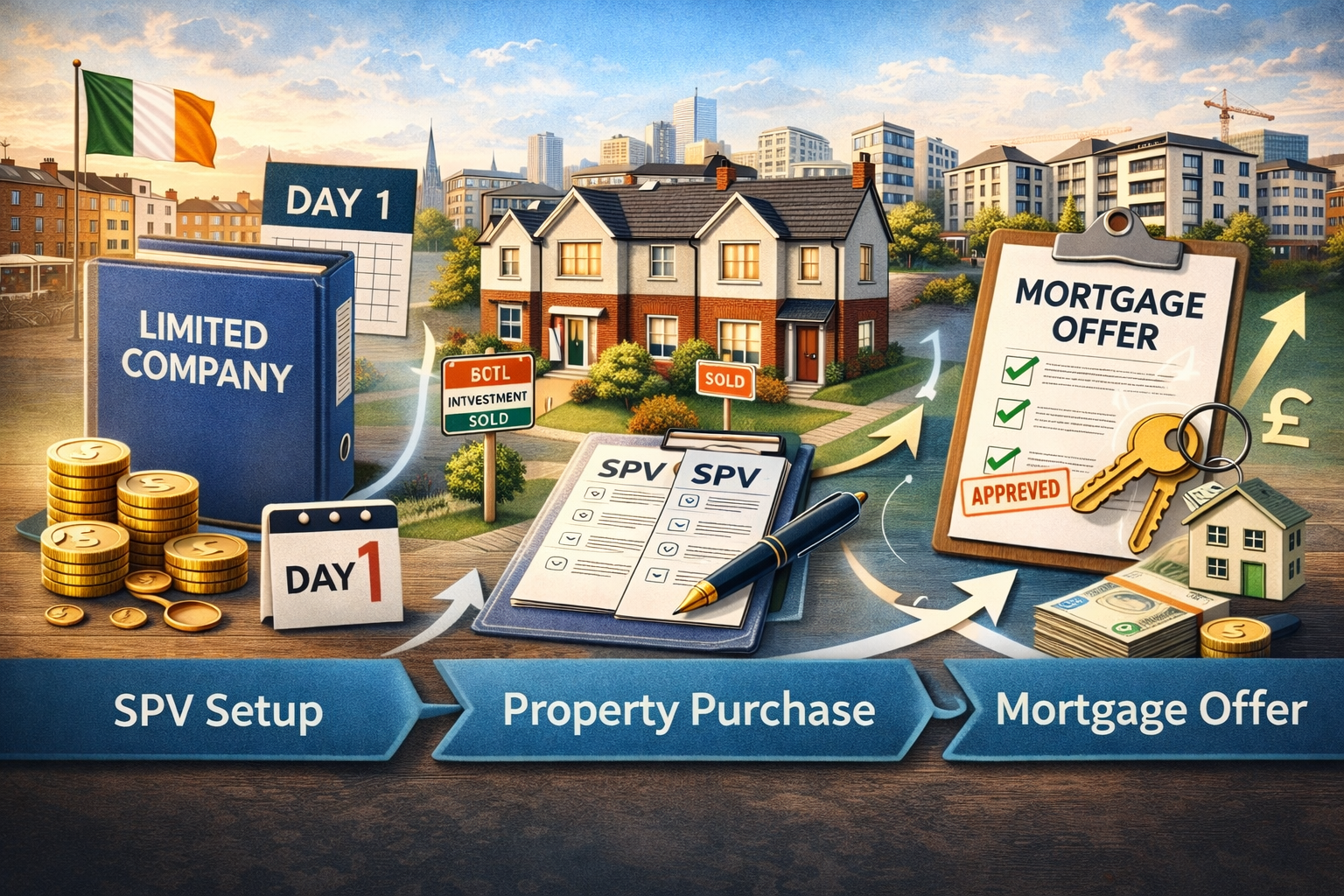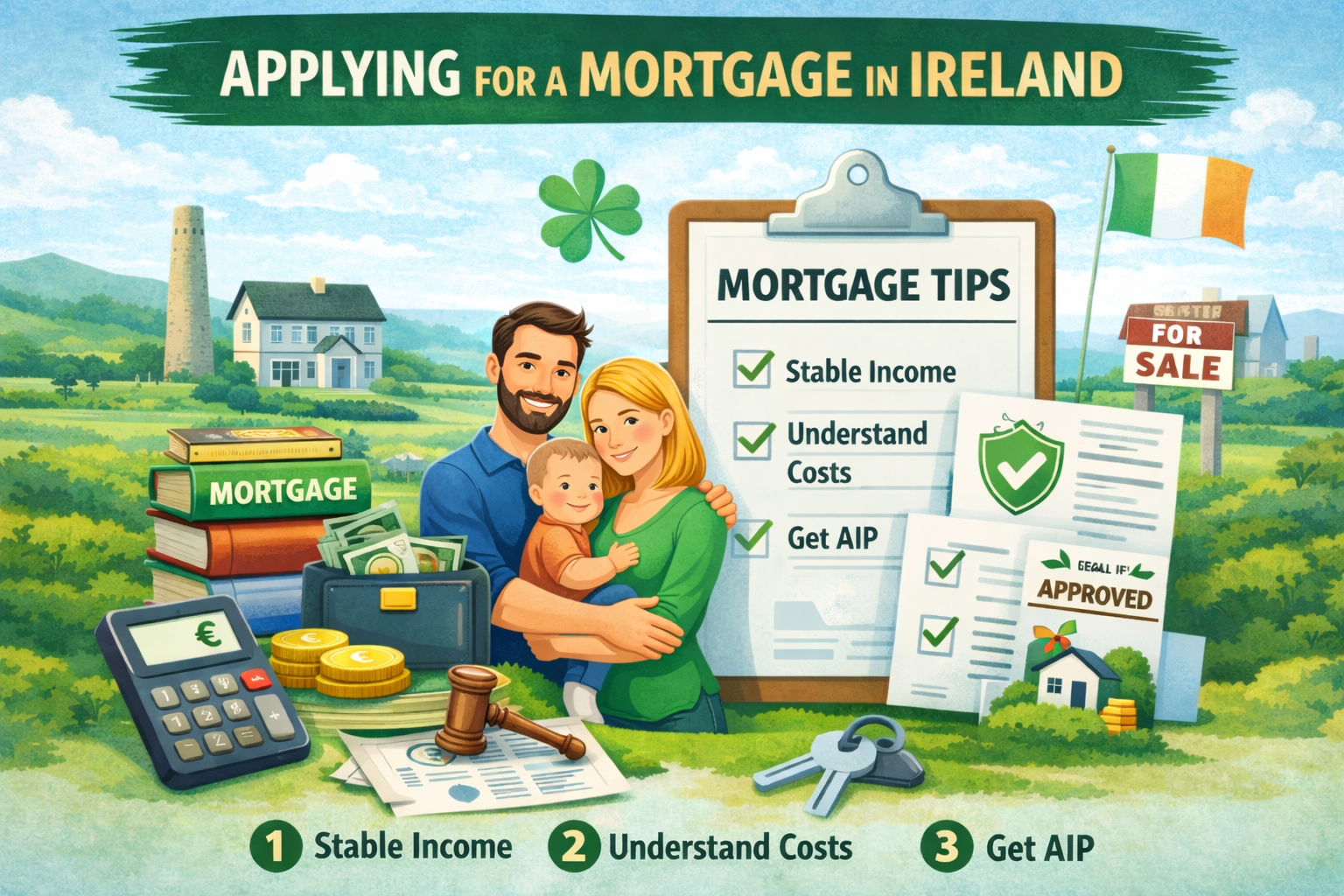The dream of owning or investing in Irish property is within reach for ex-pats, though it comes with distinct challenges. From requiring a significant deposit and meeting strict eligibility requirements to navigating different lender expectations due to overseas income, navigating the world of ex-pat mortgages in Ireland can seem daunting. However, armed with the right knowledge and preparation, you can successfully overcome these hurdles.
Ex-Pat Mortgages Ireland: A Comprehensive Guide
In today’s globalised world, the dream of owning a property in Ireland while living abroad has become more accessible than ever. Whether you’re an Irish citizen working overseas or an ex-pat looking to invest in Irish real estate, understanding the intricacies of ex-pat mortgages is crucial. This comprehensive guide delves into everything you need to know about ex-pat mortgages in Ireland, from eligibility criteria to documentation requirements and step-by-step guidance on how to secure your dream home from afar. With tailored advice and expert insights, this blog will equip you with the knowledge necessary to navigate the Irish property market confidently.
What is an Ex-Pat Mortgage?
Ex-pat mortgages are a financial lifeline for those living abroad who wish to purchase a property in Ireland. Essentially, they work much like traditional Irish mortgages but cater specifically to individuals residing outside the country at the time of application.
These mortgages are designed with certain adjustments that take into account the unique circumstances of ex-pats. This means your income earned overseas can be used in the evaluation process, although additional documentation may be required to verify earnings and stability.
The concept unlocks opportunities for Irish citizens or residents dreaming of returning home someday or investing in their homeland while away. It also often appeals to foreign nationals with strong ties or plans for long-term residency in Ireland.
Understanding this framework is crucial as it sets the foundation for navigating through mortgage options tailored specifically for you, ensuring smooth sailing toward property ownership back home.
Eligibility Criteria for Ex-Pat Mortgages in Ireland
If you’re considering applying for an ex-pat mortgage in Ireland, understanding the eligibility criteria is crucial.
- Irish citizenship or proof of residency is often a key requirement. It can open doors to more favourable options with lenders.
- Your employment status matters too. Most lenders prefer applicants who have stable and verifiable income sources.
- A minimum deposit is typically requested. This varies by lender but generally ranges from 20% to 30% of the property’s value.
- Credit history plays a significant role as well. Ensure you maintain a good credit score both in your home country and abroad.
- Lenders will also assess your ability to repay the loan based on your current financial standing. Factors like existing debts and assets come into play here, making it essential that all documentation is clear and up-to-date.
Documentation Required for Ex-Pat Mortgages in Ireland
When applying for an ex-pat mortgage in Ireland, you’ll need to gather specific documentation. This helps lenders assess your financial stability and eligibility.
- Start with proof of identity. A valid passport or national ID card is essential. It’s the initial step in verifying who you are.
- Next, provide evidence of income. Recent payslips or employment contracts are crucial here. If self-employed, tax returns or business accounts come into play.
- Credit history plays a significant role as well. Obtain credit reports from both your country of residence and Ireland if available.
- Proof of address shows where you’ve lived recently. Utility bills or bank statements work well for this purpose.
- Be prepared to share details about any assets or liabilities you have too. This paints a fuller picture of your financial situation for potential lenders.
- Gather all these documents ahead of time to streamline the application process significantly.
You might also like our post on How To Get A Mortgage In Ireland As An Ex Pat.
How to Prepare for a Mortgage Before Moving to Ireland?
Save for a Deposit
Saving for a deposit while living abroad is a crucial first step toward securing your dream home in Ireland. Most Irish Ex-pat mortgage lenders typically require at least a 30% deposit. This means if you’re eyeing that perfect €500,000 property, you’ll need to show around €150,000 in savings.
It’s important to remember that for first-time buyers, there are government incentives such as the Advantages of the Help-to-Buy Scheme. This can significantly ease the burden by providing financial support from the start.
To boost your savings, consider creating a dedicated account specifically for your future Irish home. Automating transfers to this account each month can make saving feel less daunting and ensure steady progress toward your goal.
Additionally, keep track of any currency fluctuations between where you’re living and Ireland. Smart timing on transfers could increase the value of your savings when converted into euros.
Consistency is key. Consider setting up a separate savings account dedicated to your deposit. Automate transfers from your salary each month, ensuring steady growth over time.
Check Your Credit Report
When considering an Irish expatriate mortgage, checking your credit report is a crucial step. Your credit history can significantly impact your eligibility and the interest rates you’ll be offered.
Start by obtaining a copy of your credit report from agencies in both Ireland and the country where you currently reside. This will give you insight into how lenders view you.
Look closely for any discrepancies or outstanding debts that could affect your application. Addressing these issues early can save time down the line.
If you’re living in places like the UAE or Qatar, be aware that it may be challenging to access your credit records once you leave. It’s essential to gather this information before relocating.
Reviewing your credit information helps pinpoint areas needing improvement. Consider strategies such as paying off small debts or addressing errors before filing a mortgage application.
Remember, a good credit score not only increases the likelihood of approval but also leads to better mortgage rates tailored specifically for ex-pats.
Ready to start your home-buying journey in Ireland? Enquire now for personalised mortgage advice tailored to your needs.
Related read: Overseas Pension Advice Ireland: How To Maximize Your Overseas Pension Benefits While Living In Ireland.
Get Your Finances in Shape
Getting your finances in shape is crucial when preparing to apply for a mortgage in Ireland. Start by reviewing your current financial situation. Identify any areas where you can reduce expenses or increase savings.
Organising your income and expenditures will help you understand what you can reasonably afford. Consider creating a budget that includes all monthly obligations, such as rent, utilities, and personal costs.
Next, begin saving consistently. A solid deposit not only impresses lenders but also gives you more options during the home-buying process. Set up automatic transfers to build this fund effortlessly.
Credit health matters immensely. Pay off existing debts and avoid taking on new ones right before applying for a mortgage. Lenders want to see responsible credit behaviour.
Lastly, keep records of your financial activities. Having clear documentation ready makes the application process smoother and shows that you’re well-prepared for homeownership as an ex-pat.
Thinking about relocating or investing in Ireland? Book a consultation to navigate the mortgage process with confidence.
- Pay off debts where possible and avoid taking on new loans or credit cards before attending an assessment. Lenders want to see responsibility when it comes down to dealing with credit card bills or loans already owned by potential buyers.
- Consistency demonstrates reliability when lenders review your application.
- Bank statements should reflect healthy financial behaviour—limited overseas spending, regular contributions towards savings, and no signs of gambling transactions.
- Stability matters too. Don’t switch jobs right before applying for a mortgage as it could raise red flags regarding job security.
FAQ’S:
What is an ex-pat mortgage?
An ex-pat mortgage is a specialised type of home loan designed for individuals living and working abroad who wish to purchase property in their home country. Tailored to accommodate unique financial situations and income sources, understanding the basics of an ex-pat mortgage is crucial when exploring options available in Ireland.
Recommended: How To Get A Mortgage In Ireland As An Expat: A Step By Step Guide.
Who can apply for an Irish ex-pat mortgage?
Anyone living abroad can potentially apply for an Irish ex-pat mortgage. This includes Irish citizens who have relocated overseas and foreign nationals seeking to invest in property within Ireland.
To be eligible, at least one applicant must be an Irish citizen, hold a valid Irish passport, and possess a PPS number. Employment status is crucial—most lenders require steady income from a recognised source.
Partners may apply jointly; however, if one is not Irish but holds a work permit or visa, they could still qualify based on their circumstances. Both self-employed and employed individuals are welcome to apply, provided they meet the financial requirements.
It’s essential to maintain good credit history in your current country of residence as well as in Ireland. Lenders will scrutinise your financial background closely during the application process.
You might also like our post on Unlocking The Path To Homeownership: Demystifying Mortgage Rates In Ireland.
How much deposit is typically required for an ex-pat mortgage in Ireland?
For ex-pats considering a mortgage in Ireland, the deposit required often differs from what local buyers face. Typically, you’ll find that lenders ask for a higher deposit.
In most cases, expect to put down at least 30% of the property’s value. This can be quite significant compared to the 10% that first-time buyers might pay locally.
The reason behind this steep requirement is simple: lending to borrowers with overseas income is seen as riskier. Banks want assurance that you are financially stable and committed to your investment.
Moreover, your location matters too. Some lenders might have specific rules based on where you’re currently residing.
If you are serious about buying a home in Ireland while living abroad, start saving early and aim for a substantial deposit. It will not only increase your chances but also help secure more favourable terms on your mortgage agreement.
Curious about your eligibility for an ex-pat mortgage in Ireland? Enquire today and learn what options are available for you.
Can I get a mortgage if I am not an Irish citizen but have a work permit/visa?
Many ex-pats wonder if being a non-Irish citizen with a work permit or visa affects their eligibility for a mortgage in Ireland. The short answer is yes, you can still apply.
Lenders typically require evidence of stable employment. A valid work permit or visa often satisfies this criterion. Some institutions may ask for additional documentation to assess your financial stability.
It’s crucial to have all your paperwork in order. This includes proof of income and residency status. Lenders want assurance that you will remain in the country long enough to repay the loan.
Keep in mind that requirements can vary between lenders. Consulting with an experienced ex-pat mortgage broker Ireland can provide valuable insights tailored to your situation. They can guide you through the process, ensuring nothing falls through the cracks during your application journey.
Secure your dream property with expert guidance. Book a consultation today and explore your ex-pat mortgage options in Ireland.
Related read: The Role Of A Mortgage Broker: How We Can Help You Secure Your Dream Home.
What documents do I need to provide when applying for an Irish ex-pat mortgage?
Applying for an Irish ex-pat mortgage requires specific documentation to support your application. These documents help lenders assess your financial stability and eligibility.
Typically, you’ll need to provide proof of identity. This could be a valid passport or national ID card.
Next, evidence of income is essential. Recent payslips or employment contracts usually suffice. If you’re self-employed, relevant tax returns may also be necessary.
Bank statements are another key requirement. Lenders often ask for statements from the last six months to evaluate your savings and spending habits.
Additionally, you’ll need proof of address. Utility bills or official government correspondence can serve this purpose effectively.
Prepare documentation related to any existing loans or debts as these will impact the lending decision significantly.
How does credit history impact the approval of an Irish ex-pat mortgage?
Credit history plays a significant role in the approval process for an Irish ex-pat mortgage. Lenders use this information to assess your financial reliability and trustworthiness.
A strong credit score can increase your chances of securing favourable mortgage terms. It demonstrates that you consistently meet financial obligations, making you a low-risk borrower.
On the other hand, poor credit history may raise red flags for lenders. Late payments, defaults, or outstanding debts can hinder your application. It might lead to higher interest rates or even result in rejection.
It’s essential to check your credit report before applying. Address any discrepancies and work on improving your score where possible. This proactive approach can greatly enhance your prospects when dealing with ex-pat mortgages Ireland options.
Recommended: Smart Budgeting Tips For First Time Home Buyers In Ireland (2025 Guide).
Are there any restrictions on buying property as an ex-pat in Ireland?
When considering buying property as an ex-pat in Ireland, it’s essential to understand potential restrictions.
Firstly, foreign buyers face no outright bans. This means many ex-pats can purchase homes or investment properties with relative ease.
However, financial requirements may vary. Lenders often require a higher deposit from non-residents—sometimes up to 30%. This is crucial for those planning to secure an Irish Ex-pat Mortgage.
Additionally, some lenders might limit the maximum loan-to-value ratio for ex-pats. This could affect how much you’re able to borrow based on your circumstances.
Documentation standards are another aspect to consider. You’ll need to provide proof of income and creditworthiness that aligns with lender expectations.
Certain locations within Ireland may have specific rules or taxes applicable solely to foreign investors. It’s wise to research these factors thoroughly before making any commitments.
Conclusion
Navigating the complexities of an ex-pat mortgage in Ireland requires careful preparation and understanding. From eligibility requirements to the necessary documentation, being well-informed is essential for a smooth home-buying process. Whether you’re an Irish citizen living abroad or a non-citizen with aspirations of owning property in Ireland, there are options available tailored to your unique situation.
Remember to save diligently for that all-important deposit, keep your credit report in check, and organise your finances before making the leap. By doing so, you’ll position yourself favourably with lenders when it’s time to apply.
With proper planning and informed decision-making, taking on an Irish ex-pat mortgage can be a rewarding journey toward homeownership back home or even your first venture into Irish real estate. Let Money Maximising Advisors help turn those dreams into reality as you navigate this exciting chapter of finding a property that fits not just your needs but also your lifestyle abroad. Click here to speak to a mortgage advisor and begin your journey.










